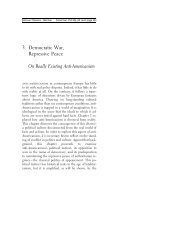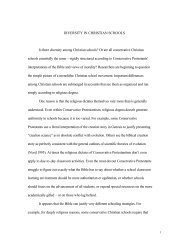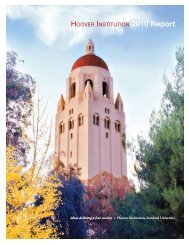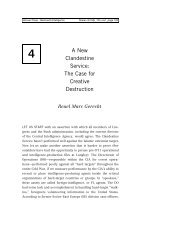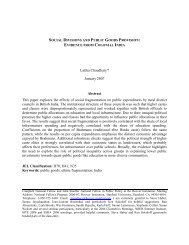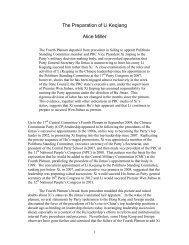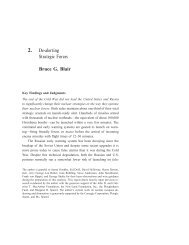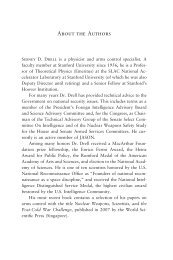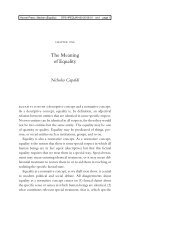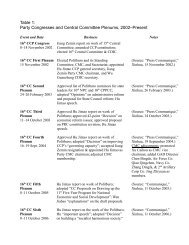Michael Boskin and Edward Lazear Interview ... - Hoover Institution
Michael Boskin and Edward Lazear Interview ... - Hoover Institution
Michael Boskin and Edward Lazear Interview ... - Hoover Institution
Create successful ePaper yourself
Turn your PDF publications into a flip-book with our unique Google optimized e-Paper software.
<strong>Michael</strong> <strong>Boskin</strong> <strong>and</strong> <strong>Edward</strong> <strong>Lazear</strong> <strong>Interview</strong> - June 15, 2010<br />
This is an unedited transcript of the interview<br />
Peter: I’m Peter Robinson. By the way, please be sure to join us on Twitter at<br />
https://twitter.com/uncknowledge... https://twitter.com/uncknowledge. A fellow at the <strong>Hoover</strong><br />
<strong>Institution</strong> <strong>and</strong> a professor of economics at Stanford, <strong>Michael</strong> <strong>Boskin</strong> served as Chairman of the<br />
Council of Economic Advisors under President George H.W. Bush. A fellow at the <strong>Hoover</strong><br />
<strong>Institution</strong> <strong>and</strong> a professor at the Stanford Business School, <strong>Edward</strong> <strong>Lazear</strong> served as Chairman of<br />
the Council of Economic Advisors under President George W. Bush. Mike <strong>and</strong> Ed, welcome.<br />
Mike: Good to see you here.<br />
Ed: Please to be here.<br />
Peter: On a scale of one to ten...one representing not a chance <strong>and</strong> ten representing it will happen<br />
for sure – how likely is it that the United States of America will become another Greece? Mike?<br />
Mike: Two to three.<br />
Peter: Oh really, I’m encouraged. Ed?<br />
Ed: Two.<br />
Peter: Okay, second one...spending more than we bring in...couple of statistics here...by January<br />
President Obama will have increased the Federal budget...the Federal deficit more in two years than<br />
President George W. Bush did in eight. He will have increased Federal spending to more than 25%<br />
of our gross domestic product...the highest proportion in American history, with the exception of<br />
WWII <strong>and</strong> he will have raised the annual deficit to some 1.4 trillion, more than three times the<br />
previous record set while you were Chairman of the CEA in 2008. Ed, why does this matter?<br />
Ed: Well it matters for two reasons...first of all right now we are talking about a very large<br />
deficit <strong>and</strong> that tends to be the focus...when people in Washington talk about the budget...they tend<br />
to focus on the deficit. The deficit matters because it tells us how much we are borrowing <strong>and</strong> since<br />
we save less than we invest, it means that we borrow from abroad. But more important what we<br />
really need to be focused on is not the deficit, but the level of spending.<br />
Peter: Okay.<br />
Ed: And the reason for that is that ah...even if we closed our deficit <strong>and</strong> that would mean that we<br />
raised taxes...we would still be not helping the economy. Taxes hurt the economy...deficits hurt the<br />
economy. So, once we’ve declared that we are going to spend at very high levels, we’re really<br />
between a rock <strong>and</strong> a hard place. We don’t have an easy way out.<br />
Peter: Mike, let me quote to you, Nobel Prize winning economist – Paul Krugman – this is Paul<br />
Krugman writing last year, “Deficits saved the world. In fact we would be better off if governments<br />
were willing to run even larger deficits over the next two years.”<br />
Mike: I think that’s silly. First of all there are two components to the deficits. One happens<br />
automatically in a recession. Receipts fall, especially if you have a very progressive income tax,<br />
they fall a lot. Some unemployment compensation goes up <strong>and</strong> some other transfer payments go up.<br />
But taxes fall a lot more than income, so disposable income falls less than before tax income <strong>and</strong><br />
Page 1 of 16
<strong>Michael</strong> <strong>Boskin</strong> <strong>and</strong> <strong>Edward</strong> <strong>Lazear</strong> <strong>Interview</strong> - June 15, 2010<br />
This is an unedited transcript of the interview<br />
that helps cushion the economy. That was actually twice as large, maybe three times as large in<br />
effect as the discretionary stimulus. The discretionary stimulus both the modest one in 2008, which<br />
President Bush <strong>and</strong> Congress did in the spring <strong>and</strong> President Obama’s eight hundred <strong>and</strong> sixty-two<br />
billion-dollar...<br />
Peter: Trillion...<br />
Mike: Eight hundred <strong>and</strong> sixty-two billion-dollar so-called stimulus bill passed in early February<br />
2009, helped the economy hardly at all. There was no big multiplier if you plot consumer spending<br />
against when disposable income changed there is very little effect...<br />
Peter: Can I just add...<br />
Mike: ...very small effect.<br />
Peter: This is not saying that the multiplier was mistaken sort of uhm...ex-ante...the figures are in,<br />
you’ve looked at the data. This is purely empirical now, it just didn’t work.<br />
Mike: I think it's fair to say. You can’t go back <strong>and</strong> re-run the economy.<br />
Peter: Right.<br />
Mike: So you’ve got to suppose what the counter factual was, with the Federal Reserve would it<br />
have done exactly the same thing...what would have consumers have done, etc. So, in a wider ray a<br />
sense of the models it turns out that multipliers tend to be pretty small. And that the number that<br />
most serious economists work with are number between a half <strong>and</strong> one, not well over one as the<br />
Administration assumed. And they happen to be larger for tax cuts, especially those that tend to be<br />
longer lived <strong>and</strong> especially those that tend to be on marginal rates than much of spending...a fact<br />
that was demonstrated in the research of Christie Roman, Obama’s own economic advisor.<br />
Peter: Okay, we’ll return here.<br />
Ed: Okay, let me just follow on that, because I think Mike makes a very important point <strong>and</strong> one<br />
that I agree with. Probably the best evidence that we see from 2009, as far as the stimulus <strong>and</strong> it's<br />
affect...is if you look at what caused the economy to turn around <strong>and</strong> it did turn around in 2009, no<br />
doubt about it...in the first quarter of 2009, GDP fell by six percentage points. That’s big, that’s<br />
huge. In the fourth quarter it rose by six percentage points. So, that’s a swing of twelve percentage<br />
points. Now, if you ask what cause the difference...the difference was all on the investment side. It<br />
was not on the consumption side, so investment fell of a cliff in the first quarter of 2009. Investment<br />
fell by 50% <strong>and</strong> we knew that at the time.<br />
Mike: We knew that investment was dropping much more sharply than consumer spending.<br />
Ed: That’s right. And then after the fourth quarter of 2009, investment picked back up. Now why<br />
is that? Well I would argue that much of that had to do with the end of the cause of the recession.<br />
The cause of recession was the financial crisis that occurred primarily in the autumn of 2008. We<br />
didn’t know it at the time, but the financial crisis...the crisis per se was probably over by the end of<br />
that quarter...by the end of autumn of 2008. That didn’t mean that the financial markets had<br />
Page 2 of 16
<strong>Michael</strong> <strong>Boskin</strong> <strong>and</strong> <strong>Edward</strong> <strong>Lazear</strong> <strong>Interview</strong> - June 15, 2010<br />
This is an unedited transcript of the interview<br />
recovered, they surely hadn’t. But in terms of crisis <strong>and</strong> in terms of the kinds of things that we were<br />
worried about back in September, those were gone.<br />
Mike: If you were to look at the four things that really affected the economy <strong>and</strong> were the<br />
proximate cause of the turnaround...the first is natural business cycle dynamics of the economy. A<br />
large part of this was inventory adjustments. The second part...the second thing would the Feds<br />
actions...monetary policy in some part of it's other extraordinary measures helped some in the<br />
commercial paper market. Some other things I thought were ill-advised, but unbalanced the Fed <strong>and</strong><br />
helped a lot. The third would be the automatic stabilizer <strong>and</strong> than last at the bottom of the group <strong>and</strong><br />
not worth the eight hundred <strong>and</strong> sixty-two billion dollar cost <strong>and</strong> a vast increase in taxes in the<br />
future that are going to apply...was the stimulus. Now, you could argue that a sensible stimulus<br />
might have been effective. Many of us argued that throughout 2008 <strong>and</strong> 2009, they maybe should<br />
have had a partial payroll tax holiday, which would have changed the calculus firmness <strong>and</strong> make<br />
how many workers they needed to lay-off to become profitable again, for example. And that works<br />
under a variety of macroeconomic theories <strong>and</strong> it even works under the Keynesian theory, which<br />
these guys seem to empower now <strong>and</strong> seem to buy, which most modern macroeconomists reject,<br />
other than for a very small short period of a very modest Keynesian in the short term. It works<br />
under a variety of other economic models <strong>and</strong> my own colleagues have at Stanford _____(00:07:17)<br />
his colleague at Rochester, Mark Bills estimated that might have saved three million lay-offs. That<br />
would have been a very wise thing to do. But what they do is that they outsourced it to the<br />
Congress. The Obama Administration outsourced it to the Congress <strong>and</strong> we had the left of the<br />
Democratic party became the barons of all committees <strong>and</strong> they have been out of power since the<br />
first years of the Clinton years, since the 1970s...so in thirty years they have been able to do very<br />
little of their agenda. They just lard it on a bunch of social engineering <strong>and</strong> pork. And whatever<br />
good you think my comment on spending on green...you know weatherizing schools <strong>and</strong> all that<br />
sort of stuff...doing that in 2011 <strong>and</strong> 12 is not going to stop lay-offs in 2009. So, it was particularly<br />
poorly thought out.<br />
Peter: Segment Two money. You’ve already started this Mike. From President Obama <strong>and</strong> the<br />
Obama Administration <strong>and</strong> fiscal policy to Fed Chairman Ben Bernanke <strong>and</strong> monetary<br />
policy...financial crisis autumn 2008...from that point within a relatively few months, the Fed<br />
engaged in an unprecedented increase in the money supply. This is the tightest statement of it I have<br />
found, this is economist Arthur Laffer, “The percentage increase in the monetary base,” this is Art<br />
Laffer writing in 2009, “is the largest increase in the past fifty years by a factor of ten. It is so far<br />
outside the realm of prior experiential base, that historical comparisons are rendered difficult, if not<br />
meaningless.” Huge liquidity into the economy <strong>and</strong> the Fed continues to keep rates so low that<br />
mortgages just dropped below 5%. Is this the right thing?<br />
Ed: Well, I would say two things on that. First, I think that Laffer’s statement is bit of an<br />
overstatement in the following sense; first the Fed has a new instrument that is available to<br />
translatory instability <strong>and</strong> that is the ability to pay interest on reserves. So a large fraction of the<br />
money that was printed is soaked back up into the system...into the Federal Reserve system. That<br />
said, uhm...I think that this is an issue more for the long run than it is for the short run. And the<br />
concern that I have...ah is that when it comes time <strong>and</strong> the Fed is already starting to unwind some of<br />
the program that it started...when it comes time for the Fed to unwind, there will be tremendous<br />
pressure on the Fed to avoid doing that. In large part because sometimes it will have to unload...in<br />
particular the mortgage-backed securities <strong>and</strong> will have direct affects on political very sensitive<br />
variables, like mortgage interest rates. And so, I think is going to be the pressure in the future...right<br />
Page 3 of 16
<strong>Michael</strong> <strong>Boskin</strong> <strong>and</strong> <strong>Edward</strong> <strong>Lazear</strong> <strong>Interview</strong> - June 15, 2010<br />
This is an unedited transcript of the interview<br />
now, it pretty hard to argue that there are strong inflationary pressure in the short run. I think most<br />
of the evidence suggests that there isn’t. But, again I think the concern is in the long run <strong>and</strong> not the<br />
short run.<br />
Peter: Mike?<br />
Mike: I agree with that. I think we can break this up into three episodes. Part one, some sizable...far<br />
from all, but some sizable – far from all – but some sizable fractionary responsibility for the crisis<br />
comes from excessively loose monetary policy earlier in the last decade. The economy by 2003,<br />
was growing at 4.5%. We had a recession in 2001, a slow recovery in 2002, <strong>and</strong> than the economy<br />
started to boom. And the Fed kept it's target short-term interest rate, so called Fed’s Fund Rate,<br />
below the rate of inflation for the next three years. So what we had was negative real short-term<br />
interest rates. So people could borrow a dollar <strong>and</strong> pay it back in ninety-eight cents later.<br />
Peter: So to some extent, the housing bubble is...<br />
Mike: It's not just housing. The housing bubble, ah low starter teaser rates on mortgages were<br />
enabled by this, home equity lines of credit, auto loans, credit cards <strong>and</strong> their receivables, private<br />
equity, all those things financed...all of this was financed at the short end. People were borrowing<br />
short <strong>and</strong> lending long...making money as long as that continued, as long as strong growth<br />
continued <strong>and</strong> there was a steep yield curve with negative real interest rates or close to zero real<br />
interest rates at the short end. Than when that changed <strong>and</strong> people couldn’t continue to borrow<br />
short-term...that’s when things really froze up. That’s number one. So, they deserve some of the<br />
responsibility for the crisis in the first place. That said; the response lowering rates down close to<br />
zero <strong>and</strong> than I think you have to think of it as a series of experiments that they did because they<br />
weren’t sure exactly what would happen. There was some history in the depression <strong>and</strong> some<br />
history in Japan in their loss debt...the so called quantitative <strong>and</strong> continuing to exp<strong>and</strong> even though<br />
you couldn’t lower interest rates any more because they were close to zero or at zero. There was a<br />
series of experiments. I think some of them were beneficial <strong>and</strong> some not. I think it was unfortunate<br />
that they started by long-term treasuries. I think that raises the specter of politicalization of the Feds<br />
activities in the future <strong>and</strong> be unable to... So, giving them higher marks, good marks for their<br />
response <strong>and</strong> than as Ed has said, the real issue is how they unwind. And that is the thing that has<br />
beguiled the Fed in the past, when they’ve had to start raising rates early before unemployment got<br />
down a lot. There is a lot of pressure on them not <strong>and</strong> I know that is Bernanke’s intention.<br />
Peter: Okay, so could I ask you – layman that I am...I can construct an argument for either<br />
worry...inflation or deflation. So, the argument for deflation, which you’ve already touched on is<br />
that there is just so much money sloshing around <strong>and</strong> it is going to be very hard...the Fed knows<br />
how as a technical matter...to scoop that excess money or what will become excess money, but it<br />
will be under intense political pressure to do so slowly <strong>and</strong> to do to. So inflation is a problem. On<br />
the other h<strong>and</strong>, mortgage rates are down below 5%, the housing industry is still lagging, surely that<br />
has to be at least in part because people are expecting prices to drop even further. So, it's...you could<br />
argue, I think that there are deflationary expectations already built into segments of the economy<br />
<strong>and</strong> Bernanke is very correct to be worried about that.<br />
Ed: I would say this is a short run versus long run phenomena. And again, I think the major<br />
problem goes back to what you were talking about earlier...it has to do with our budgetary<br />
pressures. So, remember where you started – you talked about the very large growth in the deficits,<br />
Page 4 of 16
<strong>Michael</strong> <strong>Boskin</strong> <strong>and</strong> <strong>Edward</strong> <strong>Lazear</strong> <strong>Interview</strong> - June 15, 2010<br />
This is an unedited transcript of the interview<br />
the high increase in the debt to GDP ratio – we’re talking about something over 70% by the time we<br />
hit 2013. Those kinds of numbers mean that the US Government will spending in the very near<br />
future, more on servicing it's debt than it's spending on national defense. And the concern for us, I<br />
think at that point becomes what do we do? Do we start raising taxes <strong>and</strong> raising taxes dramatically,<br />
or do we essentially default on the debt through higher inflation. The US is never going to default<br />
on the debt, that’s simply...so the way we would do that would simply be to say; are we going to<br />
have a very high rate of inflation...at a rate of inflation that essentially renders that debt worth much<br />
less to the creditors than it was in the past. I think that’s the big concern.<br />
Mike: It's a legitimate concern, but we’ve – the government has moved so much to short-term<br />
financing of it's debt. The duration...the average duration is around four years, so you don’t get a lot<br />
out of inflation...it rolls over too fast. So, you can’t – it's the long-term debt if you can fix nominal<br />
rates it's get hit when there is a higher inflation rate.<br />
Ed: Going back to longer terms.<br />
Mike: So very slightly so far. So, if they start moving back quite a bit <strong>and</strong> there is a lot of pressure<br />
to inflate, than we will wind up with a lot of chaos in the markets <strong>and</strong> a lot of pressure. I want to<br />
come back to the debt <strong>and</strong> deficit though. Because the way to think about it when the government<br />
borrows a dollar – that means in the future it's going to pay back that dollar plus a series of interest<br />
payments. So the present value of all that is the dollar discounted back to today. So if it fixes the<br />
level of spending...every dollar borrowed today is a dollar, plus interest of taxes in the future. So,<br />
the reason people worry about big deficits <strong>and</strong> debt is they look at it that if we don’t get spending<br />
under control, large tax increases. If you look at episodes in history, episodes around the<br />
world...recently <strong>and</strong> throughout time...we can look at two episodes...one with high debt ratios <strong>and</strong><br />
one with high taxes. If we look at the last quarter century before the crisis, you could rank the major<br />
large economies exactly in inverse order the size of their government sectors. The ones with the<br />
biggest taxes <strong>and</strong> spending...Germany <strong>and</strong> France...grew the slowest. Brittain in between the United<br />
States, with the smallest...grew more rapidly. Now there is some causality. There are many other<br />
factors, but there are some people...<strong>and</strong> I think it's much of the reason, but it's not all. That’s number<br />
one. Number two, you look at debt ratios. The IMF believes that every ten percentage point increase<br />
in the debt ratio will slow growth by about two tenths or a quarter of a point. Ah...another thirty or<br />
forty points that Obama is adding or more...into the future would wind up slowing growth by three<br />
quarters of a point let’s say, which is roughly half of our long-term per capita growth rate. So, there<br />
are big, big issues...big, big issues <strong>and</strong> when you look at when countries have gotten into the debt<br />
crisis’s, it tended to be when the debt GDP ration started to approach eighty, ninety, or a hundred<br />
percent in the gross debt. That’s a technical term because we have some net debt costs of Social<br />
Security holding some <strong>and</strong> we’re headed there by the end of the decade. So, that’s typically been a<br />
time where there have been big problems. And we have some other issues...we borrow in dollars,<br />
which is the world’s reserve currency so that may give us a little break with the largest most liquid<br />
capital market. But the notion somehow that we’re invulnerable to any of things is a foolish one.<br />
The math is the same for everybody.<br />
Peter: Segment Three, where we st<strong>and</strong>. Ed you talked about the swing by the end of...the GDP<br />
dropped six percent...give me the quarter...first quarter?<br />
Ed: Oh, 2009. The first quarter 2009 <strong>and</strong> fourth quarter...<br />
Page 5 of 16
<strong>Michael</strong> <strong>Boskin</strong> <strong>and</strong> <strong>Edward</strong> <strong>Lazear</strong> <strong>Interview</strong> - June 15, 2010<br />
This is an unedited transcript of the interview<br />
Peter: Fourth quarter 2009, it recovered by 6%, so there is a 12% ...alright.<br />
Ed: For a quarter. This is annual rate for a quarter.<br />
Peter: Annual rate for a quarter.<br />
Ed: The economy would have had to have dropped six percentage points for four quarters to<br />
have actually fallen 6%.<br />
Peter: Okay, got it, got it. Thank you very much. That actually is quite important. Alright, so again<br />
layman’s question...since the end of the second World War, the general rule seems to be the deeper<br />
the recession, the sharper the recover, right? So, having just gone through the worst recession since<br />
the end of the second World War, we ought to be feeling a rocket rumbling underneath this<br />
economy by now. The Dow is monkeying around, around ten thous<strong>and</strong> <strong>and</strong> has for some months.<br />
May jobs report shows about 450,000 jobs created, but only 41,000 of those are in the private<br />
sector, the rest accounted for entirely by Federal hiring. So what’s going on? This is not a roaring<br />
economy. This is not a sharp recovery, is it?<br />
Mike: Well you have to distinguish GDP growth from labor market growth.<br />
Peter: Alright.<br />
Ed: So GDP growth has been pretty strong in the past half year. In fact, when I left CEA in<br />
2008, we had a forecast <strong>and</strong> we said what would it look like in early 2010...<strong>and</strong> we said 5% <strong>and</strong><br />
everybody thought that was ridiculous. Well it turned out it's 4.5% over the past six months.<br />
Unfortunately, it's backwards. It was 6% in the fourth quarter of 2009 <strong>and</strong> than 3% in the first<br />
quarter of 2010. So, that’s not such a great sign. The problem has been that the labor market has not<br />
responded very quickly. And I don’t think that any of the gimmicks...any of the so-called job<br />
creation techniques that the government has attempted to use, have been effective. Unfortunately,<br />
we only know one way to create jobs...<strong>and</strong> that is to make sure that the economy grows <strong>and</strong> grows<br />
rapidly. The best prescription for that is keeping tax rates low <strong>and</strong> making sure that they low into<br />
the future. As you know, 2010 is a key year. It is the year during which many of the taxes that went<br />
into effect under President Bush’s tax cuts are going to expire. Capital gains, dividend reductions,<br />
as well as the highest marginal rate will most likely change. Those are impediments to investment.<br />
They are impediments to growth, <strong>and</strong> they are impediments to hiring.<br />
Mike: Let me go back to this issue of the growth. I think it's likely that when the recession is dated,<br />
it will be dated as having ended in the summer of 2009. If we date since then, one quarter earlier<br />
than the numbers Ed did, we have averaged 3% growth since the recession ended.<br />
Peter: _____(00:19:29)<br />
Mike: ...which is three quarters. In the other two comparable large deep recessions, 1974/75 <strong>and</strong><br />
1981/82, when unemployment got to 9% <strong>and</strong> 10.8%, higher than this time around by the way,<br />
respectively. The economy grew between 5 <strong>and</strong> 6% for three years. So, this is an anemic recovery<br />
<strong>and</strong> it's poor in job growth <strong>and</strong> it's modest at best in GDP growth, in my opinion.<br />
Peter: Mike, listen to George...<br />
Page 6 of 16
<strong>Michael</strong> <strong>Boskin</strong> <strong>and</strong> <strong>Edward</strong> <strong>Lazear</strong> <strong>Interview</strong> - June 15, 2010<br />
This is an unedited transcript of the interview<br />
Mike: Part of that is Obama’s...the prospect of higher taxes...but also Obama’s policies have been<br />
very anti-business...very anti-jobs...very anti-investment...a lot of uncertainty has been created. A<br />
lot of increased costs of labor are being piled on.<br />
Peter: George Weil writing in June, “Investors <strong>and</strong> employers are uncertain about when interest<br />
rates will rise <strong>and</strong> by how much...” That’s a Ben Bernanke question, but now here comes a Barack<br />
Obama question. “They do not know how badly the economy will be burdened by the expiration of<br />
the Bush Tax Cuts. They know the costs of Obamacare will be higher than advertised, but not how<br />
much higher. They do not know the potential costs of Cap <strong>and</strong> Trade. They do not know how the<br />
financial sector will be altered <strong>and</strong> impeded by the many new regulatory rules <strong>and</strong> agencies.” If you<br />
are an employer or a venture cap...why would you hire people right now? So I guess what I am<br />
probing for here is...actually two questions. One question is, you both are ah...came of age <strong>and</strong> you<br />
studied your academics during this period, but how bad does what we went through...how bad is it<br />
by comparison to the late 70s, say? Is this just a repeat of a cyclical something or other we should<br />
expect every twenty to thirty years?<br />
Ed: I think in terms of the effect on the economy, it's quite comparable to the late 70s <strong>and</strong> the<br />
early 80s. I don’t think this is any worse.<br />
Mike: I agree.<br />
Ed: However...yeah you know when you have 20 to 22% interest rates...when you have 10.8%<br />
unemployment...the difference is a new path was chartered for economic policy in the early 1980s,<br />
which had lower taxes, more sensible <strong>and</strong> less regulation <strong>and</strong> the like, okay? Lower inflation, better<br />
monetary policies...<br />
Peter: So Clinton in effect, validated it making it bipartisan. So there’s real stability <strong>and</strong> certainty,<br />
right?<br />
Ed: Yeah, we argued over a point or two of GDP <strong>and</strong> taxes <strong>and</strong> so on back <strong>and</strong> forth<br />
subsequently, but Clinton started from the center of left <strong>and</strong> move to the center. Obama started more<br />
from the far left <strong>and</strong> we will see if he moves to the center left. However, I do want to make one<br />
other point about what happened in this period - which is that the financial crisis...ah was much<br />
more severe this time...I had to help clean up the previous financial crisis with the third world debt<br />
problems, the money center banks, <strong>and</strong> the savings <strong>and</strong> loans. Which were problems that started in<br />
the late 1970s through the early 1980s. We wound up cleaning them up in 1989.<br />
Peter: Right.<br />
Ed: And so they had problems that had been sweep aside for some period of time <strong>and</strong> we<br />
cleaned them up <strong>and</strong> the economy had a sluggish couple of years because of that. So, I think part of<br />
this is the financial crisis <strong>and</strong> part of it is Obama’s policies <strong>and</strong> the uncertainties of the policies, but<br />
if Obama got his policies through the way he wanted them, it would be worse than uncertainty<br />
because than we have a certain poor set of policies.<br />
Peter: A last question about how weak or how strong the economy is right now. Uhm...one more<br />
reference to Arthur Laffer here, who wrote in the Wall St. Journal in June <strong>and</strong> made the point that<br />
Page 7 of 16
<strong>Michael</strong> <strong>Boskin</strong> <strong>and</strong> <strong>Edward</strong> <strong>Lazear</strong> <strong>Interview</strong> - June 15, 2010<br />
This is an unedited transcript of the interview<br />
the tax cuts...all kinds of tax cuts are said to expire on January 1 st <strong>and</strong> made the point that human<br />
beings respond to incentives, so individuals <strong>and</strong> enterprises are shifting...realizing as much income<br />
as they can this year to beat the tax hikes next year. There is income shifting going on <strong>and</strong> in fact<br />
the economy looks better, because of that than it's likely to. So, here’s the money quotations, “When<br />
we pass...” this is Art Laffer, “when we pass the tax boundary of January 1, 2011, my best guess is<br />
that the train goes off the tracks. If you thought deficits <strong>and</strong> unemployment have been bad lately,<br />
you ain’t seen nothing yet.” In other words, the economy looks stronger in some way today than it<br />
really is. Do you buy that?<br />
Ed: Well, I buy it a little bit. Everything that he is talking about is anticipated. So, this is not like<br />
something that is going to come as a big surprise to us. It's also a little bit difficult to substitute from<br />
the future to the present. It's not the case that people are working very hard today because they<br />
know their tax rates are going to go up in the future. I don’t think there is a lot of evidence that<br />
that’s the case. In fact, one of the things that is different in this recession <strong>and</strong> a bit in the previous<br />
recession in early 2000/01...uhm...is that the labor market has responded somewhat differently. The<br />
cut in the number of jobs is much more dramatic than it was in previous recessions. Productivity<br />
growth has remained high, which is unusual for recessions, at least historically. It used to be that<br />
during a recession what would happen is labor would stay on, productivity would go down, <strong>and</strong><br />
than as the recovery came on, productivity would increase. In this particular recession,<br />
unfortunately from worker’s points of view...the lay-offs, the amount of job cuts has been much<br />
more significant <strong>and</strong> employers have gotten much more savvy about reducing their costs.<br />
Peter: So productivity goes up <strong>and</strong> employment goes down...is close to the same thing.<br />
Productivity is just a measure of output per worker.<br />
Ed: Per worker.<br />
Peter: So, to what extent...so to what extent as to what we are watching a ratification of the<br />
technology revolution? Employers are using this moment to shift into technology <strong>and</strong> shift out of<br />
_____(00:25:10)...<br />
Ed: I don’t think it's quite that. I think technology <strong>and</strong> people are compliments, not substitutes.<br />
So, as we look to the future, technology is not a bad thing for workers. Technology is a good thing<br />
for workers. The problem is the business cycle affect on workers <strong>and</strong> unfortunately, this has been a<br />
periods when we have seen very significant lay-offs relative to the drop in GDP. So, I agree with<br />
Mike, if you look back <strong>and</strong> you say, “Gee is this the worst recession?” You know, people always<br />
say this is the worst recession since the Great Depression. First of all, it's a lot different from the<br />
Great Depression. It may be the worst by some measures, it may not be worst by others, if you look<br />
at the unemployment rates in the early 80s, they are a bit worse. But the point is, this is a very bad<br />
recession along the lines of the kind that we have seen in the past. What’s different is that the job<br />
picture is, I think less promising as we move into the future <strong>and</strong> that’s unfortunate.<br />
Mike: And I think a big part of that has to be laid on the prospect of a much higher cost of labor,<br />
because of the Obama agenda.<br />
Peter: Okay, Segment Four, economics, a brief history of the profession. Mike, I am going to quote<br />
you. This is you writing in 2008, shortly after Barack Obama defeated John McCain. Quoting<br />
<strong>Michael</strong> <strong>Boskin</strong>, “Those of us who supported the other guy, hope Mr. Obama succeeds...” very<br />
Page 8 of 16
<strong>Michael</strong> <strong>Boskin</strong> <strong>and</strong> <strong>Edward</strong> <strong>Lazear</strong> <strong>Interview</strong> - June 15, 2010<br />
This is an unedited transcript of the interview<br />
gracious. And now here’s something even more gracious...”We like his top economic<br />
appointments.” Oh?<br />
Mike: Yeah, I think they’re capable economists, however, it turns out what seems to have<br />
happened to the Obama Administration is that all the calls have been political <strong>and</strong> there has been<br />
very little sound economics.<br />
Peter: Okay, so here’s what President Obama’s Chair of the Council of Economic<br />
Advisors...you’re a successor <strong>and</strong> you’re a successor...Christina Romer...doctorate for MIT. Taught<br />
at Princeton <strong>and</strong> Berkley, Director of President Obama’s National Economic Council, Larry<br />
Summers, former President of Harvard University...these are serious people. What are they<br />
thinking.<br />
Ed: Well I would say, you know I don’t want to criticize the people who are in office right now.<br />
I think they are trying to do the best they can <strong>and</strong> we all know these are not easy jobs. I think they<br />
have a different view of economy than Mike <strong>and</strong> I probably do. Larry is a terrific economist...a<br />
great person <strong>and</strong> I think someone who is trying to help the economy, but he...<br />
[Multiple speakers talking over]<br />
Ed: I am going to tell you...from my point of view, I think he believes in Keynesian Economics<br />
much more than I do. I think he believes that the stimulus has worked to a much greater extent than<br />
I do. Uhm...unfortunately the stimulus doesn’t work in large part, not only because the multiplier<br />
might be below one, but also because it is very difficult to get the money out there. We learned that<br />
<strong>and</strong> I learned that directly from the tax rebates that we did in 2008. When we did those tax rebates<br />
<strong>and</strong> by the way the tax rebates are somewhat different from the stimulus, because the tax rebates at<br />
least give the money back to the people. It's not additional spending...<br />
Peter: Right.<br />
Ed: ...government spending. So, there’s a bit of a distinction there. But still, I have to confess in<br />
retrospect...when I look back from the evidence from that tax rebate, it was really underwhelming.<br />
The reality is that we spent about a hundred <strong>and</strong> fifty billion dollars, we figure we got maybe a third<br />
to half of that out into the economy over the first six months <strong>and</strong> it had really very limited effect on<br />
economic growth. I think the same has been true during the Obama Administration, unfortunately<br />
they didn’t the lesson I think that they could have gotten from us. But, they believe in what they are<br />
doing, I simply don’t believe that it works.<br />
Peter: Mike, you spoke earlier about the 70s versus the 80s...again a layman’s question – in the<br />
1980s you have in this country, smaller government, lower taxes, less regulation, restrained<br />
consistent monetary policy...growth. At the same time the central planning is bringing Russia <strong>and</strong><br />
Eastern Europe into collapse. I had sort of thought that between Milton Freedman <strong>and</strong> George<br />
Stigler <strong>and</strong> Gary Beckler on the intellectual side <strong>and</strong> the actual lived experience of the 1980s <strong>and</strong><br />
1990s, your profession...economics...had gotten some place. Conclusions had been reached. Now,<br />
am I simply mistaken about that? Did the Keynesian big government spending stimulus model just<br />
simply continue...did it just kind of go underground for a while <strong>and</strong> now it has sprung back forth? Is<br />
it considered still a coherent alternative model to free markets?<br />
Page 9 of 16
Mike: Well describe...<br />
Peter: Intellectual l<strong>and</strong>scape.<br />
<strong>Michael</strong> <strong>Boskin</strong> <strong>and</strong> <strong>Edward</strong> <strong>Lazear</strong> <strong>Interview</strong> - June 15, 2010<br />
This is an unedited transcript of the interview<br />
Mike: There is something called “New Keynesian View.” If we go back intellectually, Milton<br />
Freedman or Frank _____(00:29:45) were at Chicago MIT at the time, but both geared people to<br />
longer-term time horizons. Bob Lucas geared us toward people’s expectations of future events <strong>and</strong><br />
supply siders, myself <strong>and</strong> academically some others on a more popular basis, geared us toward<br />
incentives. And those things got incorporated into the main stream macroeconomics. But, there’s<br />
was always...so the New Keynesians started to take a look at what happened when you did some of<br />
this, but still had what they thought of as a very sticky prices <strong>and</strong> wages, so the economy could get<br />
stuck <strong>and</strong> you might need a more activist government. So that’s kind of the neo-intellectuals. On the<br />
intellectual side, if one the leading New Keynesian theorists, <strong>Michael</strong> Woodford at Columbia <strong>and</strong> in<br />
a paper that he just gave in Atlanta in 2010...says he can only get the multiplier up to one in extreme<br />
cases when the Feds is at zero interest rate, so we are expected to stay there for the duration of when<br />
the spending is done. So, I think intellectually it's kind of broken done. However, there is this<br />
political urge to do something <strong>and</strong> that’s very powerful. And I myself, <strong>and</strong> many...most economists<br />
believe there is some short run wear in where an extreme environment in Keynesian Economics has<br />
some partial validity. But it's not large multipliers, but there’s a very short time period.<br />
Peter: So...<br />
Mike: So this has been, I think, kind of exaggerated to make a political case <strong>and</strong> the politicians<br />
above wanted it. But more importantly...you know the President’s economists wouldn’t have<br />
designed the stimulus package the way it was. It was designed in the House. You can go on <strong>and</strong> on<br />
for all the variety of things that were done. I think if there was a case for it, the case was really for a<br />
partial payroll tax suspension or something of that sort. This was really very ill-timed, not much of<br />
it got out quickly, as Ed has said, <strong>and</strong> it's had a very, very small impact on the economy. One place<br />
it's probably done or prevented some lay-offs was in the State <strong>and</strong> Local sectors, because there were<br />
large subventions to State <strong>and</strong> Local governments, which helped them financially when they were<br />
running deficits.<br />
Peter: So when it comes down to it, again the layman’s question. I watched the Obama<br />
Administration <strong>and</strong> clearly there are intense political pressures. Clearly, Nancy Pelossi <strong>and</strong> Henry<br />
Waxman <strong>and</strong> the liberals who have descended into the chairmanship of both important committees<br />
in the House had a huge...but than there is Larry Summers <strong>and</strong> there is Christina Romer, so<br />
overwhelmingly, it's politics <strong>and</strong> you with your deep vow of professional curtsey to these folks, but<br />
what’ really going on is they’re trying to impose on what is essentially a political set of events,<br />
some intellectual coherence <strong>and</strong> some...is that right?<br />
Ed: I think that’s a little too strong. I would say...<br />
Peter: You too?<br />
Mike: I partially agree <strong>and</strong> than it gets exaggerated in the political front.<br />
Ed: I think that the economics profession, despite the evidence that we have for macroeconomics<br />
over the past thirty to forty years, decided in 2008, that we were going to believe the Keynesian<br />
Page 10 of 16
<strong>Michael</strong> <strong>Boskin</strong> <strong>and</strong> <strong>Edward</strong> <strong>Lazear</strong> <strong>Interview</strong> - June 15, 2010<br />
This is an unedited transcript of the interview<br />
model, but we needed something to work. I think it was more hope than it was based on evidence,<br />
but unfortunately that was what was going on. Not only in the Administration, but I think that was<br />
going on throughout most of the economics profession <strong>and</strong> I hear it constantly. When I watch the<br />
Business Press, Business News...many very distinguished economists will talk about the effect of<br />
the stimulus, how the economy has rebounded, not only in the United States, but in Europe in large<br />
part because of government action. China is another case in point. I just don’t believe it. I just don’t<br />
think we have the support system.<br />
Mike: Let me give you an example of how outrageously exaggerated this is. President Obama often<br />
says something almost exactly like the following, “It largely because of the stimulus bill that we<br />
avoided a second great depression.”<br />
Peter: Right.<br />
Mike: If you go back to Christie Romer <strong>and</strong> Jared Bernstein’s analysis of the stimulus, they said<br />
for three quarters or so, we are going to have a one percentage point lower unemployment because<br />
of the stimulus. Okay, now they were probably talking about an eight rather than nine <strong>and</strong> it actually<br />
got up to ten, so maybe it would have gone up to eleven. But in any event, that’s nothing like...so<br />
their own estimate of the effect of it was tiny compared to this kind effusive statement by the<br />
President <strong>and</strong> by many people in the political process. So that’s what I mean by it gets exaggerated<br />
as it's told <strong>and</strong> then it got kind of distorted in the political process from something that might have<br />
been somewhat effective to something that was fairly ineffective.<br />
Peter: I want to move on to the next segment, but just a kind of summary statement...basically what<br />
it comes down to is that Milton Freedman did not win a decisive <strong>and</strong> intellectual victory, as I had<br />
supposed. That is to say there is still a Neo-Keynesian view...there is this notion that stimulus can<br />
be effective, that government must step in a dramatic way...that still lives on in respectable ways<br />
within the profession.<br />
Ed: I would say that lives on, but I would say that if anything I would take the evidence of the<br />
past couple of years as supporting, not contradicting Milton’s view. Markets have worked <strong>and</strong> they<br />
have worked remarkably well. If you look at how badly markets have punished the players who got<br />
out of line, it's dramatic. Now, people will say the bail-out saved this guy...for the most part people<br />
got killed by that action <strong>and</strong> if anything, the market over reacted. So there was a period. I remember<br />
being on Wall Street with my former boss, President Bush, when he said, “You know you guys got<br />
drunk <strong>and</strong> we’re all feeling the hangover.” And the problem is that’s true, but there was a period for<br />
a couple of years where people wouldn’t even drink water. So, there were even very good loans,<br />
very good things out there that could have been done <strong>and</strong> the market was simply unwilling to do<br />
that, because the market is a ruthless task master <strong>and</strong> in fact, I think when it comes to punishing, the<br />
market doesn’t variate.<br />
Mike: I think one thing that needs to be dealt with <strong>and</strong> disposed of...is kind of the strong h<strong>and</strong> that<br />
some, particularly some on the left point out as conservatives or Freedman or people who kind of<br />
are...believe in a lighter h<strong>and</strong> of government that we want no regulation. One thing that clearly<br />
failed was the regulatory system...regulatory apparatus. It was ill-designed...there were<br />
gaps...people were asleep at the wheel from the New York Federal Reserve to the FCC to so on <strong>and</strong><br />
so forth. So, while we’re probably over doing it now, the fact of the matter is that we didn’t have<br />
perfect market reactions. We had indeed, a lot of people who were driven to make profits <strong>and</strong> they<br />
Page 11 of 16
<strong>Michael</strong> <strong>Boskin</strong> <strong>and</strong> <strong>Edward</strong> <strong>Lazear</strong> <strong>Interview</strong> - June 15, 2010<br />
This is an unedited transcript of the interview<br />
saw gaps <strong>and</strong> they took advantage of it. That got exp<strong>and</strong>ed into the IGs <strong>and</strong> in the extreme case<br />
Fannie <strong>and</strong> Freddie <strong>and</strong> cases of that sort. To President George W. Bush’s credit, he tried to reign in<br />
Fannie <strong>and</strong> Freddie <strong>and</strong> didn’t get anywhere. I tried to raise that on top of the S & L’s when I was<br />
the CEA Chairman <strong>and</strong> was told that you will never get the S & L’s, which were essentially Fannie<br />
<strong>and</strong> Freddie.<br />
Peter: Okay Segment Five...where do we go from here? Governor Mitch Daniels of<br />
Indiana...”What we’ve seen in the past year, what I call shock <strong>and</strong> awe statism...has put the<br />
American experiment at risk. For the first time in my life, the country faces survival-level issues.” A<br />
little dramatic or accurate?<br />
Ed: I think it's accurate. If we continue on this path <strong>and</strong> this path means fiscal irresponsibility,<br />
very large increases in expenditures, not dealing with the entitlements problems that we<br />
have...Social Security <strong>and</strong> Medicare <strong>and</strong> Medicaid being the most important obviously...the new<br />
health bill is not going to bend the curve down. I don’t think anybody believes that. Even if you<br />
believe that the...<br />
Peter: Bend the curve of costs?<br />
Ed: The costs. I mean even if you believe...even if you believe that this budget deficit neutral or<br />
even reduced deficit, you have to remember that it's still an increase in spending of a half trillion<br />
dollars. So, it's only deficit neutral because it comes associated with large tax increases. All of those<br />
things, I think are prescriptions for an economy that is going to grow much less rapidly in the<br />
future. The problem is not just at the level of government, when the economy grows less rapidly<br />
obviously that puts fiscal pressure on us because it's harder to balance the budget <strong>and</strong> it's much<br />
easier to create an environment where you stay with low deficits when the economy is growing, but<br />
the main thing is the st<strong>and</strong>ard of living. If you just look at individual st<strong>and</strong>ard of living <strong>and</strong> you ask<br />
where will our children be relative to where they could have been had we maintained the low tax,<br />
high growth, open economy policies that we had in the past...I think it's going to be quite different.<br />
Mike: We are at serious risk. We have wide swaths of the economy under state control <strong>and</strong><br />
direction <strong>and</strong> there has not been a clear exit strategy enunciated by this Administration for many of<br />
them. I think that’s deeply unfortunate. Even if they think they are going to take time to lay out an<br />
exit strategy...its going to take eighteen months or something like that...lay it out in tiers or<br />
something of that sort. I think it's a major, major problem <strong>and</strong> they seem to be bullying every sector<br />
that tries to do something in the normal course of business. Now they are going after...<br />
Ed: BP.<br />
Mike: BP...<strong>and</strong> now the insurance companies, etc. BP deserves some attention...they may have<br />
done some things that they shouldn’t of <strong>and</strong> certainly there is an ecological diaster <strong>and</strong> they should<br />
be held accountable. On the other h<strong>and</strong> we have the large fiscal issues <strong>and</strong> so if you can think<br />
of...there is no worst time to be exp<strong>and</strong>ing the government...<br />
Ed: Right, right.<br />
Mike: ...than as we are heading into the baby boomers retirement <strong>and</strong> we are going to have the<br />
extra demographic pressures on top of the rising cost pressures in healthcare <strong>and</strong> the rising real<br />
Page 12 of 16
<strong>Michael</strong> <strong>Boskin</strong> <strong>and</strong> <strong>Edward</strong> <strong>Lazear</strong> <strong>Interview</strong> - June 15, 2010<br />
This is an unedited transcript of the interview<br />
benefits for beneficiaries in Social Security. So this Administration, I think has been basically <strong>and</strong><br />
the Congress has basically treated resources as free, but they are not. Every dollar we borrowed, all<br />
these trillions of dollars, that’s gonna get paid back in higher taxes in the future <strong>and</strong> that’s going to<br />
be a big drag on the economy. There is no doubt about that over say a ten or twenty-year period. So<br />
I think in that sense, it's a big issue. Even if we just go halfway to a European Social Welfare state<br />
that would be such a big change from where we were <strong>and</strong> it's likely that that would slow growth<br />
considerably.<br />
Peter: Two basic remaining questions...only two. As a matter of pure economics, what should we<br />
do? And as a matter of practical politics, how can we get it done. So, Ed give me a nice tight<br />
summary statement of what we ought to do.<br />
Ed: I would say two things. One, is we need to reform our tax code <strong>and</strong> two, keep our taxes low.<br />
So, when I say reform our tax code, there’s an issue of what should be the appropriate kind of taxes<br />
that we have. We’re far from the optimal tax structure. Mike spent much of his career studying<br />
taxes. I was on the President’s Tax Panel before going to the government <strong>and</strong> there are many things<br />
that we could to reform that would be very beneficial to the economy. The second thing is keeping<br />
taxes low. And there is only one way to keep taxes low. You can’t keep taxes low when you have<br />
spending high. If spending grows there will be natural pressure to raise taxes <strong>and</strong> close the deficit<br />
gab <strong>and</strong> that’s going to be a reality. So, what we have to do is we have to get control of our<br />
budget...I will let Mike talk about the politics on it...<br />
Mike: Well let me just say that I generally agree with what Ed had to say. I think it's substantially<br />
much easier than they are letting on. All these new programs...all these this big expansion...I think<br />
we should reverse much of that. I think that any change in the healthcare system should be narrowly<br />
targeted...<br />
Peter: Right.<br />
Mike: And I think our attention should be on controlling the rising healthcare costs. In Social<br />
Security we can index the initial benefits by prices rather than wages. Nobody’s benefits would go<br />
down, everybody’s benefits would be at least at the current real level of benefits <strong>and</strong> that would<br />
solve all the Social Security long-run problems. We should be getting much more rigorous in our<br />
evaluations of these programs <strong>and</strong> the government should be scaling back <strong>and</strong> partly for emergency<br />
reasons...we’ve got a whole slew of things from education to infrastructure to a variety of other<br />
things that have been justified as if resources are free <strong>and</strong> their not.<br />
Peter: Okay.<br />
Mike: And those things should be ended. They should be phased out in a sensible way <strong>and</strong> we<br />
should be putting limits on spending, we should be...<strong>and</strong> remember there are three sets of<br />
conservatives in the Republican party <strong>and</strong> around the country. Those who want to keep taxes low,<br />
those who want to keep spending low, <strong>and</strong> those who want to balance the budget. You basically<br />
need to do all three within appropriate measures within the budget.<br />
Peter: Okay. At CEA you are working in the White House, which means this is not pure<br />
economics. You are paying...you are at least aware of...intensely aware of the surrounding politics.<br />
Let me to you two strains of thought, alright? One is noted by Mike from a writing in February, you<br />
Page 13 of 16
<strong>Michael</strong> <strong>Boskin</strong> <strong>and</strong> <strong>Edward</strong> <strong>Lazear</strong> <strong>Interview</strong> - June 15, 2010<br />
This is an unedited transcript of the interview<br />
write, “Mr. Obama’s programs increase the fraction of people getting money back from the<br />
government...more money back from the government than they pay in taxes...almost 50%, just as<br />
the demographics on an aging population will drive it up further.” Argument...we’ve already passed<br />
a tipping point, roughly half or more than half of voters have already been turned in effect into<br />
clients of the Federal government <strong>and</strong> once that happens, you’re as a political matter, you’re not up<br />
yet, but as a political matter, it is really hard to reverse – viewpoint one. Viewpoint two, Governor<br />
Haley Barber of Mississippi, who was the Republican National Chairman in 1994, when<br />
republicans recaptured the House, says “This is the best moment...” not long ago, “since 1994.”<br />
Former Governor Jeb Bush of Florida said he senses that people would be willing actually to<br />
undertake to permit cuts in entitlements for the first time perhaps in his entire political career. The<br />
Tea Party Movement, the election of Scott Brown from Massachusetts...for the first time Gallup<br />
shows...for the first time in years Gallup shows that more people call themselves republicans than<br />
democrats...there is this strange coexisting strains of real pessimism about what has already<br />
happened in the country with enormous hopefulness that there may be a decisive movement against<br />
the welfare state, seventy years after the new deal...how do you read it? How do you read the<br />
current situation there?<br />
[Multiple speakers]<br />
Ed: So, first of all I think it's very dangerous for society to get into a position where more than<br />
half the voters get more back from the government than they pay in taxes.<br />
Peter: That’s real...that’s a serious problem.<br />
Mike: Some of that is...a lot of the temporary stuff that Obama did. So if we can end that, we can<br />
get back down to around 40%...so I think we have a window <strong>and</strong> that window is maybe the next few<br />
years...five or ten years, if we can get this under control. We will then get well into the baby<br />
boomers retirements <strong>and</strong> it would be very, very difficult to start curtailing Social Security <strong>and</strong><br />
Medicare growth, not the levels, but the growth per beneficiary. So, I think there’s an opportunity.<br />
Second of all, I think people are ingassed <strong>and</strong> I think Obama badly misread the country. He thought<br />
that this was an FDR moment...that everybody would move left because of the problem...they<br />
would want <strong>and</strong> welcome this government with open arms <strong>and</strong> people ingassed at the things that<br />
have been done from the bail outs to the spending to the deficits <strong>and</strong> they are very concerned for<br />
their future <strong>and</strong> their children’s future <strong>and</strong> I think that there is an opportunity to channel that into a<br />
constructive, more moderate, more modest, but much effective government. Because a successful<br />
society needs an effective government, whether you have an oil spill...whether that’s in the<br />
military...whether it's the local police...whether that’s decent schools...whatever it happens to be, but<br />
we are trying to get the government to do too many things...it doesn’t do many of them well. It does<br />
most of them very inefficiently <strong>and</strong> it costs too much. We need to do for example what Major<br />
Giuliani did in New York...which was eight years Giuliani spending less per capita spending, but he<br />
improved on almost every service in various ways. Some of that is being emulated by cities around<br />
the country. We need somebody to go in <strong>and</strong> do that for the Federal Government – reduce,<br />
eliminate, withdraw, <strong>and</strong> than where the government really has an important role to play – make<br />
sure it's effective, nimble, <strong>and</strong> not so bureaucratic.<br />
Peter: Mike sounds pretty chipper...<br />
Ed: I would say I am even more optimistic than Mike...<br />
Page 14 of 16
Peter: Are you really?<br />
Ed: In the long run, I am. I have...<br />
<strong>Michael</strong> <strong>Boskin</strong> <strong>and</strong> <strong>Edward</strong> <strong>Lazear</strong> <strong>Interview</strong> - June 15, 2010<br />
This is an unedited transcript of the interview<br />
Peter: You are the opposite of Keynesians in the long run...in the long run things will work out.<br />
Ed: I have a lot of faith in the American people to have long-term wisdom <strong>and</strong> while people<br />
panic in the short run there is no question that this was a period during which panic was rampant...I<br />
think that over the long haul that people will realize that the United States has been successful<br />
primarily for one reason <strong>and</strong> that is that we encourage individual effort...we encourage people to go<br />
out be entrepreneurs...we encourage people to find their own way <strong>and</strong> we help them when they need<br />
help, but we don’t do that to excess. I think people underst<strong>and</strong> that’s the right formula for the<br />
United States. I think people will push back in that direction. I hope that President Obama will in<br />
the second half of his term underst<strong>and</strong> that in the same way that President Clinton did in his later<br />
years as President. I think that he...as Mike said earlier...President Clinton moved to the right <strong>and</strong> he<br />
did so wisely, because he understood not only the mood of the country, but he also understood that<br />
that was the way to successful economic growth.<br />
Mike: Yeah...<br />
Peter: Two last questions.<br />
Mike: ...I think it would be good for the country <strong>and</strong> very good for him politically...he easily won<br />
reelection once he moved to the center.<br />
Peter: Uhm...we have an election coming up in the November. Is the economy going to improve<br />
markedly between now <strong>and</strong> than or even note...it won’t feel different?<br />
Ed: No.<br />
Peter: Okay, so there is no swing between the democrats...<br />
Ed: Anybody who says they know what it will look like on the eve of the election is far too sure<br />
of themselves, because there are wide possibilities.<br />
Mike: We know...what we do know...hang on a second...<br />
Ed: Can I please finish...<br />
Mike: What we do know...well you just contradicted my statements so...what we do know is<br />
unemployment is going to remain very high.<br />
Peter: Over 9%?<br />
Mike: Well, somewhere around 9% at a minimum. And what we do know is that right now, people<br />
have about one-third as high a chance of finding a job today, as they did in 2007, that hurts <strong>and</strong><br />
that’s gonna be felt at election time.<br />
Page 15 of 16
<strong>Michael</strong> <strong>Boskin</strong> <strong>and</strong> <strong>Edward</strong> <strong>Lazear</strong> <strong>Interview</strong> - June 15, 2010<br />
This is an unedited transcript of the interview<br />
Ed: So, I don’t think we disagree...I am just saying it's unclear what will happen over the next<br />
six or seven months. What is clear is that the economy will not be in good shape. It's likely to be a<br />
little bit better than now, would be a base case...that’s about it.<br />
Peter: Okay, last question. So that’s between now <strong>and</strong> November...now let me ask you twenty-five<br />
years from now...I am trying to get sort of your sort of body temperature on optimism versus<br />
pessimism...twenty-five years from now, will historians look back at the first two years of Barack<br />
Obama’s Administration as the moment when the country moved decisively in the direction of the<br />
European style welfare state. Or, do you feel there’s a real rejection. Is something decisive taking<br />
place now. Mike?<br />
Mike: I think that remains to be seen. I think if there is a big reaction in the polls in November,<br />
either President Obama will move to the center <strong>and</strong> if it continues or he will not get reelected in<br />
2012, so either he has to change or somebody else has to be making the policy. I think there is a<br />
decent chance of that. I would twenty-five years looking back to now, I would say it's fifty/fifty.<br />
Peter: Ed:?<br />
Ed: I agree with Mike. I think that again, if you look at the first two years of the Clinton term<br />
<strong>and</strong> look how disastrous that was for President Clinton. You know, he looked very similar to<br />
President Obama in those first two years. You had the Republicans take the House in 1994...it made<br />
a huge difference in terms of his policies <strong>and</strong> I think we look back at that term very differently now<br />
than we would have had that not happened. I think the question will be whether President Obama<br />
moves with the country after this election.<br />
Peter: Okay, so even the wisest of men have to wait <strong>and</strong> see what the American people do at the<br />
polls <strong>and</strong> than have Barack Obama respond to that.<br />
Mike: One big difference is that Hilary Care lost.<br />
Peter: Yes.<br />
Mike And that actually in my opinion...I think the proper lesson from that is that it saved Clinton’s<br />
presidency. It is not very different from what has happened now, so there is a lot of contention<br />
about the roll out of health care reform that President Obama has to look at.<br />
Peter: Ed <strong>Lazear</strong>...<strong>Michael</strong> <strong>Boskin</strong>, thank you very much.<br />
Mike: It's a pleasure, Peter:.<br />
Peter: I am Peter Robinson for Uncommon Knowledge <strong>and</strong> the <strong>Hoover</strong> <strong>Institution</strong>. Thanks for<br />
joining us.<br />
Unidentified Male: You guys are pretty smart, you know?<br />
Page 16 of 16



